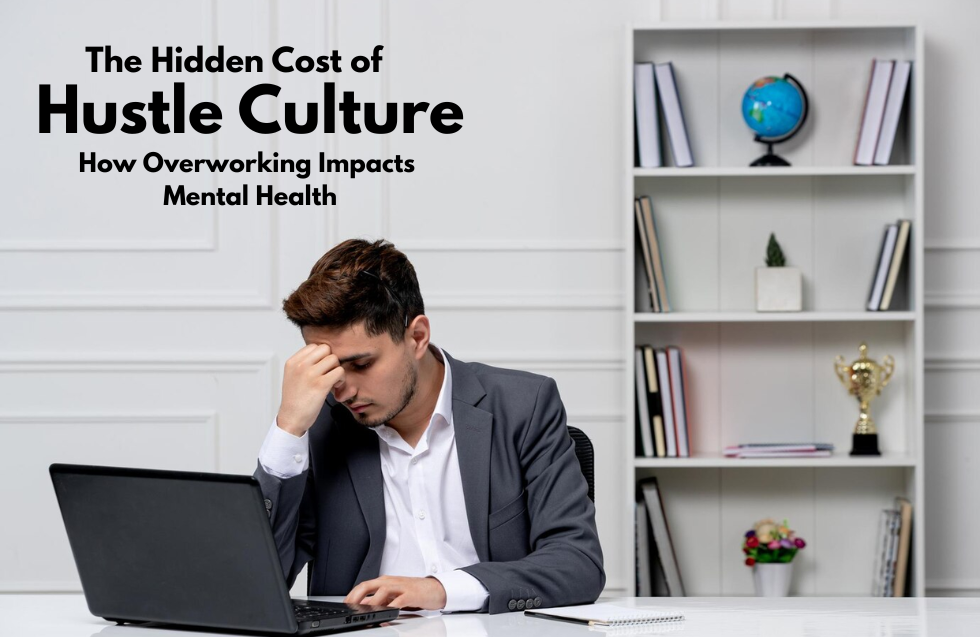In today’s hyper-connected, fast-paced world, hustle culture has become the silent anthem of modern business life. Social media glorifies it, entrepreneurs praise it, and workplaces often reward it. Phrases like “Rise and grind,” “No days off,” and “Sleep when you’re dead” aren’t just motivational mantras — they’ve morphed into expectations that push people to their mental and physical limits.
But this constant drive for productivity can quietly pave the way for dangerous coping mechanisms. Many individuals trapped in this cycle turn to substances — caffeine, stimulants, alcohol, or even prescription medication — to sustain the pace, leading to addiction before they even realize it. Beneath the polished surface of professional ambition, overwork is fueling a mental health crisis where stress, burnout, anxiety, and addiction often go hand in hand, silently eroding well-being across teams and industries.
The Rise of Hustle Culture: Why We Glorify Overwork
Hustle culture romanticizes the idea that success is only achievable through constant effort, long hours, and personal sacrifice. In many industries, especially startups, tech, finance, and entrepreneurship, working 12-16 hour days isn’t just normalized — it’s celebrated.
For some, the thrill of being “busy” creates a false sense of purpose or self-worth. For others, it stems from fear:
- Fear of being replaced
- Fear of missing out on success
- Fear of appearing weak or uncommitted
This creates a toxic loop where burnout is seen as a badge of honor rather than a red flag.
The Mental Health Consequences of Overworking
When work consumes every waking moment, mental health suffers in ways both subtle and profound:
1. Chronic Stress and Anxiety
Constant deadlines, back-to-back meetings, and excessive multitasking flood the brain with cortisol, the body’s stress hormone. Over time, this leads to:
- Sleep disturbances
- Heightened anxiety
- Poor concentration
- Impaired decision-making
2. Burnout
The World Health Organization classifies burnout as an occupational phenomenon characterized by:
- Emotional exhaustion
- Cynicism or detachment from the job
- Reduced professional efficacy
Burnout doesn’t just make you feel tired — it robs you of joy, creativity, and resilience.
3. Depression and Isolation
Working long hours often means sacrificing social connections, hobbies, and downtime — all essential for emotional balance. This isolation can spiral into feelings of loneliness, inadequacy, and hopelessness, increasing the risk of clinical depression.
4. Physical Health Decline
Hustle culture doesn’t just strain the mind; it weakens the body too. Chronic overwork is linked to:
- High blood pressure
- Cardiovascular disease
- Weakened immune system
- Digestive issues
Mental health and physical health are deeply intertwined. When one falters, the other often follows.
The Workplace’s Role in Enabling Hustle Culture
While individuals may buy into the hustle myth, workplaces often reinforce it — both directly and indirectly:
- Rewarding presenteeism over productivity
- Glorifying all-nighters and overcommitment
- Lack of clear boundaries for work hours, especially in remote or hybrid setups
- Inadequate mental health support systems
Without realizing it, many companies create environments where stress is seen as part of the job — rather than a sign that the system is broken.
Breaking Free: A Healthier Definition of Success
Undoing hustle culture doesn’t mean lowering ambitions; it means redefining what sustainable success looks like.
1. Normalize Rest and Recovery
Recovery is productive. Adequate sleep, weekends off, and scheduled vacations aren’t luxuries — they’re necessities for long-term health and professional performance.
2. Set Boundaries
Leaders and employees alike should model healthy boundaries. That means:
- Logging off after work hours
- Respecting personal time
- Creating a culture where saying “no” is acceptable
3. Invest in Mental Health Resources
Forward-thinking organizations offer more than wellness workshops:
- Access to mental health professionals
- Stress management coaching
- Flexible work policies that support mental well-being
4. Redefine Productivity
Productivity isn’t measured in hours but in outcomes. Creative problem-solving, innovation, and strategic thinking require mental clarity — something that chronic overwork destroys.
Conclusion: The Human Cost Is Too High
Hustle culture might promise financial gain or recognition, but the mental health cost is one few can afford. Emotional well-being is not a “soft skill” — it’s the foundation for both personal fulfillment and professional success.
When businesses prioritize mental health alongside performance, they don’t just reduce absenteeism or turnover. They cultivate healthier, more creative, and more resilient teams.
Breaking free from hustle culture isn’t a sign of weakness — it’s a sign of evolved leadership.











